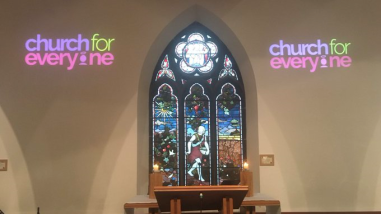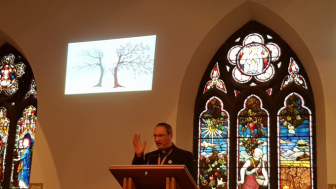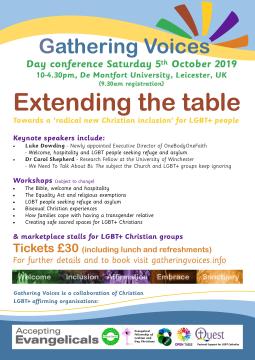The Church for Everyone conference took place at St James and Emmanuel Church in Didsbury Manchester, hosted by their vicar Rev Nick Bundock. This is part of this country’s only inclusive deanery.
For part 1, click the link here.
The next speaker was the National co-ordinator of Inclusive Church, Ruth Wilde. The inclusive Church website can be accessed here.
Inclusive Church, as an organisation, started with a letter of protest. It was a letter of protest about the Jeffrey John affair, when the then Archbishop of Canterbury Rowan Williams asked him not to accept the position of bishop of Reading, because of its effect on the wider church. A short summary of this can be found here. The letter was signed by thousands of people. This led to a meeting held in a church in London. From this Inclusive Church was born.
Inclusive Church is a network of churches, groups and individuals uniting together around a shared vision:
“We believe in inclusive Church – a church which celebrates and affirms every person and does not discriminate. We will continue to challenge the church where it continues to discriminate against people on grounds of disability, economic power, ethnicity, gender, gender identity, learning disability, mental health, neurodiversity, or sexuality. We believe in a Church which welcomes and serves all people in the name of Jesus Christ; which is scripturally faithful; which seeks to proclaim the Gospel afresh for each generation; and which, in the power of the Holy Spirit, allows all people to grasp how wide and long and high and deep is the love of Jesus Christ.”
Inclusive Church may have been born out of LGBT exclusion, but rapidly grew to explicitly include working in other areas of exclusion. All exclusion comes from a similar sense of entitlement and power, so working for inclusion of anyone is working for the inclusion of others too.
Inclusive Church’s flagship event every year is the disability conference, held at St Martin in the Fields church in London. Information about the 2019 conference is here.
She then shared a reading from John Chapter 4, telling the story of Jesus meeting the Samaritan woman at the well. This was a scripture that was very important for her and her work. Jesus had challenged the privileged and put the experience of the marginalised in the centre. The Samaritan woman who had been excluded from her society was saved by Jesus and then she was able to save and redeem the same people who had shunned and rejected her.
Andrea King from Affirming Baptists spoke next.
The foundational scripture she shared with us was 1 Corinthians 12 about all the different members of the body of Christ being equally important. That spoke directly to inclusion. All members of the body of Christ are equally important.
There are too many suicides happening. Mistreatment from faith communities can sink deeply into people and it is not eh sort of thig that you can just wash off. The pain that is caused can be very deep. It can be presented as ‘spiritual correction’ or ‘discipline’. Why should we have to carry that? This experience of faith communities can be harmful to Rainbow people.
Some experience shame when they see that sort of treatment of members of the Rainbow community. This is not what God commands us to do. In John 13 we are commanded to love one another. But we cannot reconcile that command with the mistreatment or exclusion of anyone.
Andrea launching a new resource at the conference. This was a resource aimed at developing reconciliation in faith groups.
Coming in part 3 Jayne Ozanne’s workshop on Spiritual Abuse.





